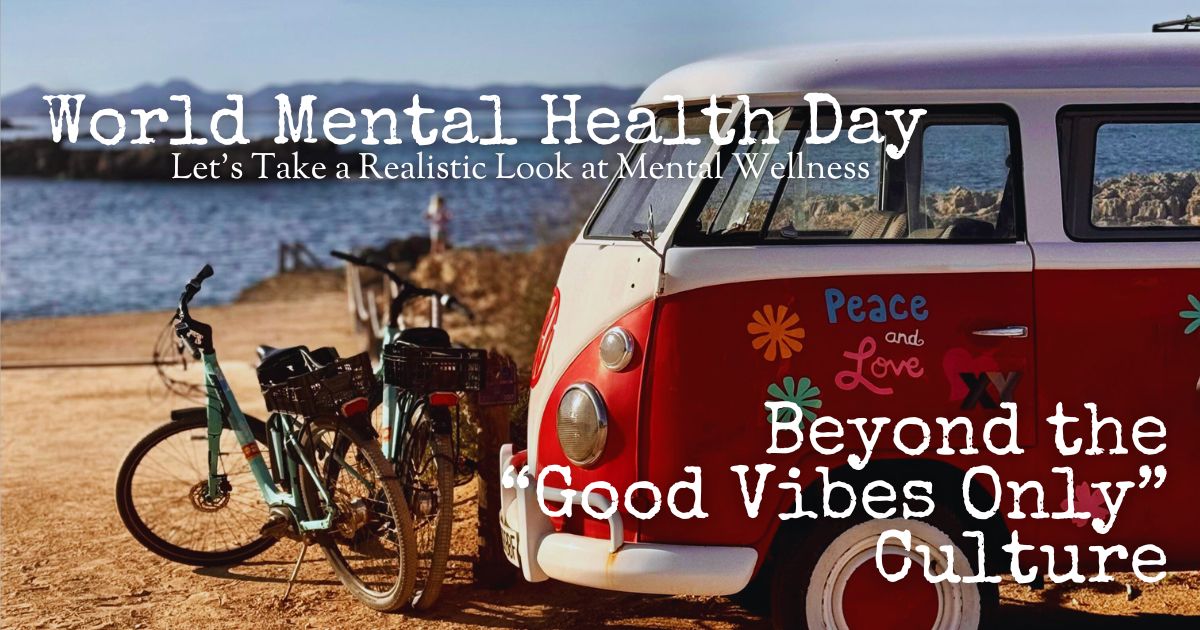
Want to learn more? Listen to the podcast discussing this blog post.
In an age saturated with curated social media feeds and self-help mantras, the pervasive message often seems to be "good vibes only." We're encouraged to manifest positivity, banish negativity, and always put on a brave face. But beneath this shimmering surface, a more nuanced reality exists: true mental wellness isn't about the constant pursuit of happiness, but rather the courageous embrace of the full spectrum of human emotion.
Mental wellness is not a destination; it's an ongoing journey, a dynamic balance that requires more than just optimistic affirmations. It's about building resilience, developing coping mechanisms, and acknowledging that life, with all its joys and sorrows, is inherently complex.
The Spectrum of Emotional Experience
The "good vibes only" culture often shames us into suppressing emotions deemed "negative," like sadness, anger, fear, or frustration. However, these emotions are not inherently bad; they are vital signals, providing valuable information about our experiences and needs.
-
Acknowledging All Feelings: Instead of suppressing difficult emotions, true wellness involves acknowledging and processing them. This means allowing ourselves to feel what we feel without judgment, understanding that emotions are transient and do not define us.
-
The Power of Vulnerability: Sharing our struggles and imperfections, even with trusted friends or professionals, can be incredibly liberating. Vulnerability fosters genuine connection and reminds us that we are not alone in our challenges.
-
Learning from Discomfort: Discomfort, while unpleasant, can be a powerful catalyst for growth. It can prompt us to reflect, make necessary changes, and develop deeper self-awareness.
Beyond the Surface: Cultivating Deeper Well-being
While positive thinking has its place, a realistic approach to mental wellness goes deeper than superficial optimism. It involves consistent, intentional practices that nourish our minds and spirits.
-
Building a Support System: Surrounding ourselves with people who offer genuine empathy and understanding is crucial. This includes friends, family, and professional therapists or counselors when needed.
-
Practicing Self-Compassion: We are often our own harshest critics. Self-compassion involves treating ourselves with the same kindness and understanding we would offer a dear friend, especially during times of struggle.
-
Developing Coping Skills: Life will inevitably present challenges. Having a toolkit of healthy coping mechanisms—whether it's mindfulness, exercise, creative expression, or spending time in nature—allows us to navigate adversity without being overwhelmed.
-
Setting Realistic Expectations: The expectation of constant happiness is unrealistic and can lead to disappointment and self-blame. Embracing the ebb and flow of emotions and recognizing that bad days are a normal part of life is a cornerstone of true mental wellness.
-
Seeking Professional Help When Needed: Just as we would seek a doctor for a physical ailment, there is no shame in seeking professional help for mental health challenges. Therapists, counselors, and psychiatrists offer invaluable tools and support.
A Journey of Authenticity and Growth
Moving beyond the "good vibes only" façade allows us to cultivate a more authentic and sustainable form of mental wellness. It's a journey of self-discovery, resilience, and compassion—for ourselves and for others. It acknowledges that life is messy, beautiful, and profoundly human, and that true well-being comes from embracing it all.
If you or someone you know is struggling, please reach out for help. You can connect with people who can support you by calling or texting 988 anytime in the US and Canada.

.png)



